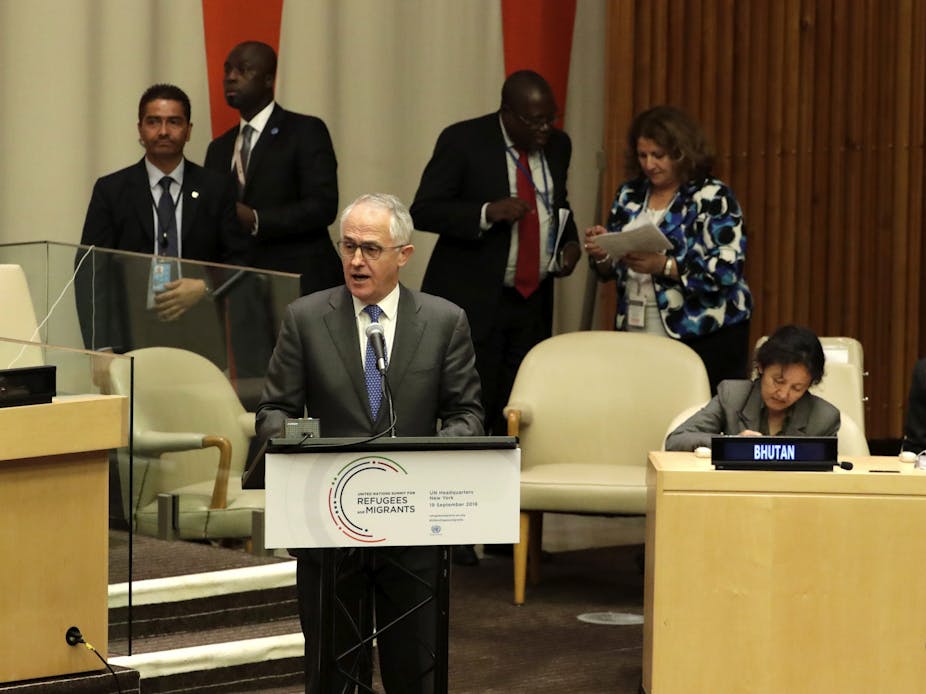The most significant contribution that Turnbull could make to the current United Nations/Obama-sponsored discussions in New York on the global refugee crisis would be to take the lead and commit to drive an Asian regional solution to the challenge.
Not only could such an initiative add some real substance to what is in danger of being just another “talkfest”, and perhaps even encourage other regions to do the same, but it’s already an imperative from our domestic point of view.
It won’t be much of a contribution if all Turnbull does is pat ourselves on the back about how effective we’ve been in securing our borders. This will in effect suggest, as Abbott did in Europe, that “the world should adopt our model”, without being prepared to acknowledge the inherent weaknesses of our national response. This also doesn’t recognise that any sustainable global or regional solution must be based on co-operation and compromise.
Offshore processing on Manus and Nauru was only ever a short-term, stopgap response. Sure, it sends the desired negative message to people smugglers, significantly weakening their business model. But it was never going to be a sustainable solution given the cost, the increasingly evident inhumanity and the lack of an effective resettlement strategy.
Recent media reports suggest the costs of these centres have accelerated dramatically, into the billions of dollars in recent years. There have been many disturbing reports of physical and mental abuse of detainees. And the Papua New Guinea Supreme Court has effectively demanded the closure of Manus, with nearly 850 asylum seekers to be “relocated” (but to where?), in the very near term.
Although the Nauru centre has a history and experience stretching back into the Howard era, Manus was always an additional, ill-conceived “quick fix”. A substantial commitment of additional untied aid was made, on top of the establishment and operating costs.
This was done without due consideration of the likely political and social difficulties of housing mostly Muslim asylum seekers, in somewhat “better” conditions than many Manus residents (mostly Christian) enjoyed. This is without any guarantee of resettlement in PNG, for those identified as genuine refugees.
So, there is now a very real urgency in our situation. But our options seem particularly limited in the absence of an effective regional framework that addresses the totality of the challenges.
Fundamental to an effective and sustainable regional solution is a process that involves source, transition, destination and resettlement countries. It also involves initially accepting the magnitude, nature and urgency of the regional refugee challenge, and each country’s roles therein. Then for them to combine to agree on the essential elements of an effective overall solution, with each, in turn, accepting their responsibilities in delivering such a solution.
For far too many years, on this and other occasions dating back to the 1970s, the source and transition countries have been more than happy to see the asylum seekers leave, or to push them on. These countries are avoiding acknowledging their roles and responsibilities and thereby magnifying the problems for others, especially destination countries. They have also resisted in assisting to define a solution.
At the very least, source countries need to do more to assist people before they leave and to accept resettlement responsibilities in the event that those who have left can be returned, if found not to be genuine refugees.
Similarly, transition countries need to accept a role and responsibility to make it difficult to just transit through their country. This can be done by setting and enforcing appropriate visa requirements and employing their police forces to close down the people smugglers.
From our national point of view, a fundamentally important element of a possible regional solution would be to seek to establish a refugee assessment centre in a transition country, such as Indonesia (from where most of our asylum seekers depart).
This would need to be at our cost, of course, and be conducted under the auspices of the UNHCR. This could destroy people smuggling, if it was also clear that any who ventured beyond that process would simply be returned to that centre for consideration.
Clearly, this would also need the backing of a well-developed resettlement strategy, so that genuine refugees could be resettled expeditiously, in the region or globally.
It is not possible in a short column such as this to canvass too much detail, except to emphasise that there is a significant global and regional refugee crisis. It represents a very significant moral, social, economic and political challenge, and needs an urgent and considered response.
The world simply can’t go on just doing little more than “more of the same”, and expecting different results. This is especially so given the recent, accelerating drift, especially in the United Kingdom (Britain’s exit from the European Union), Europe and the United States towards nationalism and isolationism that is anti-globalisation and anti-immigration. This threatens the global order of the last several decades from which most have benefited.
The need for innovative, but sensitive, and constructive leadership has rarely been greater. Malcolm could make a very significant contribution.

